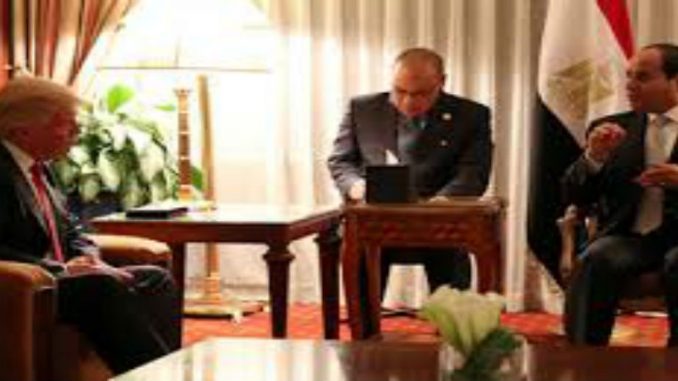
Abdel Fattah al-Sisi’s scheduled meeting with US President Donald Trump on April 3, 2017, comes at a time when human rights are at a nadir in Egypt and under threat in the US, according to Human Rights Watch.
In fact, al-Sisi’s meeting with Trump is the first visit by an Egyptian head of state to the White House since 2009.
Al-Sisi, a former defense minister who overthrew Egypt’s first freely democratic elected president, Mohamed Morsi, in July 2013.
During his reign, the country oversaw the brutal dispersal of opposition protests that left more than 1,150 people dead.
Moreover, al-Sisi’s security forces have arrested tens of thousands of Egyptians and committed flagrant rights abuses, including torture, enforced disappearances, and likely extrajudicial executions, according to Human Rights Watch.
Despite the excessive deterioration in human rights conditions in Egypt,there are strong signs that Trump will move Egypt’s human rights records to the sidelines.
The White House said, prior to al-Sisi’s visit, that it would no longer allow human rights issues to become a public point of conflict with Egypt, which was described by the New York Times as “another striking shift away from years of American foreign policy.”
Aides also said the two leaders would focus on security and economic matters. Although the aides said human rights remained a concern,” Mr. Trump prefers to deal with those issues in private.”
In the same context, a White House statement praised al-Sisi for waging a vigorous war against terrorists and making efforts to strengthen Egypt’s economy, while making no mention of his crackdown on domestic opponents.
It said, “President Al Sisi has taken a number of bold steps since becoming president in 2014, including calling for the reform and moderation of Islamic discourse and initiating courageous and historic economic reforms.”
The White House written statement said also that terrorism posed a major threat to Egypt’s stability. It said,”The United States is fully committed to helping Egypt take the necessary steps to defeat Sinai-based terrorist groups.”
In fact, the decision to sideline human rights issues in Egypt publicly comes just days after the Trump administration told Congress that it would lift human rights conditions imposed by President Barack Obama and resume arms sales to Bahrain , another critical ally in the Middle East and host country of the United States Navy’s Fifth Fleet.
Sara Margon, Washington director at Human Rights Watch, said “Inviting al-Sisi for an official visit to Washington as tens of thousands of Egyptians rot in jail and when torture is again the order of the day is a strange way to build a stable strategic relationship.”
According to Human Rights Watch, “Al-Sisi, who was elected in May 2014, has presided over near-total impunity for abuses by the military and security forces and the severe restrictions on civil and political rights, effectively erasing the gains of the 2011 uprising that ousted the longtime ruler Hosni.”
As a result, it seems that Trump administration seeks to rebuild its strategic relation with Egypt as the new administration officials said in a briefing that “US president wanted to back Mr al-Sisi’s progress on tackling terrorism in the Sinai peninsula, where an ISIL branch is active, and in reforming the economy.”
One official added, “And he wants to use al- Sisi’s visit to reboot the bilateral relationship and build on the strong connection the two presidents established when they first met in New York last September.”
Al-Sisi was one of a few world leaders Trump requested to meet when he was a candidate on the sidelines of the UN General Assembly in September.
At that time, the meeting reflected how close it would be the relations between Egypt and US if Trump reached power .
Trump expressed to al-Sisi “his strong support for Egypt’s war on terrorism, and how under a Trump administration, the United States of America will be a loyal friend, not simply an ally, that Egypt can count on in the days and years ahead.
Trump also said that if elected president, he will work with Sisi to fight terrorism, describing him in a speech as someone who recognizes that “this ideology of death must be extinguished.”
After the meeting, Trump’s team released an account of his meeting with Sisi that was striking in how much praise the Republican heaped on Egypt.
On the other side , when al-Sisi was asked directly about his opinion on the US elections – during an interview with the CNN after meeting with Trump – and the possibility that Trump would make a strong leader, al-Sisi replied by saying “no doubt.”
Moreover, al-Sisi was among the first World Leader to congratulate Trump to congratulate him on his victory.
In the same context, Sameh Shoukry was the first Arab official to meet US elect official in the new administration which infers how warm will be the relation between both countries.
There is no doubt that Donald Trump administration would favor al-Sisi regime as” the both leaders have many views in common.”
It is known that Trump opposes the attempts of change in the region known as “The Arab Spring”, tends to support stability, and is against any radical changes in the region. In addition, Trump views war on terrorism as a top priority for US foreign policy.
Brookings institution has stated in an article titled “Trump’s Misdiagnosis of the Jihadists Threats” that Trump policy in the Middle East will differ from former US presidents who had a different diagnosis and thus different treatment.
” Presidents Bush and Obama believed that the lack of good governance and political freedom were the root cause of jihadism, not religion. As a result, Bush and Obama pushed for political reform in the Arab world,”said Brookings.
However, “Trump and his closest national security advisers want unconditional support for Muslim autocrats who have vowed to reform Islam to stop the violence. At the top of the list are President Abdel Fatah al-Sisi in Egypt and King Abdullah in Jordan, who have both said religious reform is a necessary prelude to defeating jihadism,” according to Brooking.
In addition, Carnegie Middle East Center said that Trump presidency could signal a “significant shift in American–Egyptian relations,” which have cooled since the 2013 coup.
For example, the United States partially suspended military aid after the military coup in 2013, later it was restored in March 2015, citing a need to combat the Islamic State in Sinai.
According to Carnegie, “However, even though the United States restored aid, Abdel Fattah al-Sisi still has not been invited to the White House, a public snub to a close American ally. Trump, however, seems to have another policy regarding Egypt.”
Carnegie added that this warming of relations can have a number of implications in terms of policy. “First, Trump’s brand of right-wing populism is likely to strengthen Sisi’s position internationally and domestically, since it is likely to create support for his continued repression of the Muslim Brotherhood and the secular opposition under the rubric of the War on Terror.’
In addition, various leaders in the GOP (the Republican party is usually referred to as the Grand Old Party GOP)-including Jeb Bush and Ted Cruz- have praised al-Sisi “signaling the affinity between the Egyptian regime and Republican Party at a time when repression was rampant in Egypt. ”
Moreover, the pressure from Washington to reduce levels of repression and allow civil society to operate, which Clinton was expected was to exert, is not expected to be one of Trump’s priority.
The Washington trip has been keenly anticipated in Egypt, where al-Sisi’s supporters see a public handshake in the White House as a symbolic validation of a leader long spurned for his human rights record.
In the end, as both the Sisi and Trump administrations are apparently expanding cooperation, especially on counter terrorism, despite these serious and ongoing human rights abuses.
In response, Human Rights Watch urged the US Congress to maintain,” at a minimum, the restrictions on security assistance from previous years unless there is serious and measurable progress on human rights, such as dropping the investigation into nongovernmental organizations, repealing the law banning protests, and beginning a review of the cases of those detained arbitrarily and sentenced solely for peacefully exercising their civil or political rights.”
It added that the Congress should ensure that the Trump administration cannot waive these restrictions.
Washington director at Human Rights Watch said, “Giving more money to the Sisi government is to the detriment of US and Egyptian interests.”
She added, “Neither side in this relationship seems interested in promoting human rights, but the gross abuses being committed by Egyptian authorities should compel Congress to keep limiting support.”



